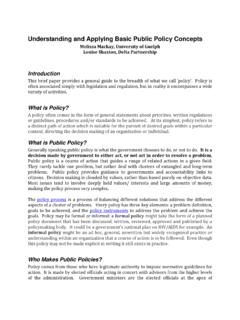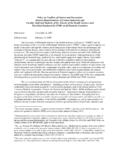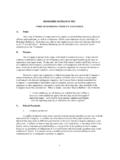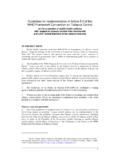Transcription of PUBLIC POLICY MAKING: THEORIES Bangladesh. …
1 PUBLIC POLICY making : THEORIESAND THEIR IMPLICATIONSIN DEVELOPING COUNTRIESF erdous Arfina OsmanPublic POLICY making is not merely a technical function of government; rather it is a complex interactive process influencedby the diverse nature of socio-political and other environmental environmental forces that form the POLICY context lead to thevariation in policies and influences the output and impact. Due to thecontextual differences, PUBLIC policies of the developed countriessignificantly differ from those of the developing countries. Althoughthe policies of developed countries have proved their effectiveness inmany cases, those cannot be applied in understanding the dynamicsof the POLICY process of developing countries.
2 PUBLIC policies in thedeveloping countries possess certain peculiarities of their own byvirtue of being influenced by an unstable socio-political environment,and face various problems and challenges. Poverty, malnutrition, illhealth, illiteracy, low standards of living, unemployment and othercommon phenomena of these countries have also been creating agrowing pessimism about the effectiveness of PUBLIC policies. Giventhis situation, in developing countries, POLICY studies deserve urgentattention. The existing THEORIES of POLICY making provide usefulguidance for analysing the policies of developing countries but theyare not quite sufficient for undertaking a comprehensive analysis.
3 Thisis because most of the POLICY making THEORIES were derived from thestudies of industrially developed societies, which in most cases, arefound insufficient to explain the policies of developing countries dueto the contextual variations. The objective of this paper is to analysethe factors that make the existing THEORIES inadequate to explain thepolicies of developing countries. To this end, the paper at first, brieflydiscusses the basic concepts of PUBLIC POLICY making and identifiescertain THEORIES of POLICY making in general that are not suitable forexplaining the POLICY making process of developing countries. Then tomake the focus of the study more specific, the theory of health policymaking has been discussed as a case and shows exactly how a theoryderived from a industrially developed country is inadequate toexamine the health POLICY making process of a developing country likeBangladesh.
4 At this attempt the paper distinguishes the POLICY contextof developing countries from that of the developed countries and alsothe POLICY context of bangladesh from other developing countries. PUBLIC POLICY making : Concepts and TheoriesIn its simplest sense, POLICY refers to a broad statement thatreflects future goals and aspirations and provides guidelines forcarrying out those goals. Hill (1993: ) defines POLICY as theproduct of political influence, determining and setting limits to whatthe state does . To be more precise, when a government takes adecision or chooses a course of action in order to solve a socialproblem and adopts a specific strategy for its planning and implemen-tation, it is known as PUBLIC POLICY (Anderson 1975).
5 POLICY scientistsargue that PUBLIC POLICY is best conceived in terms of a process (Jenkins,1978, Rose,1976; Anderson, 1978). This is because POLICY decisionsare not something confined to one level of organization at the top, orat one stage at the outset, but rather something fluid and everchanging (Gilliat, 1984 ). Rose (1969: ) also made a similarargument when he said, POLICY making is best conveyed bydescribing it as a process, rather than as a single, once-for-all act .This process involves negotiation, bargaining and accommodation ofmany different interests, which eventually give it a political political interactions happen within the network through whichdecisions flow, programmes are formulated and implemented andinter organisational dependencies and interactions take place.
6 Thus POLICY making is not a simple rather a complex dynamic processinvolving series of actions and inactions of varieties of groups withvarieties of interests at different stages. Here it is important to notethat PUBLIC POLICY making not only involves the PUBLIC bodies or publicofficials as POLICY actors; rather, private or non-official groups also playa very active role in POLICY making . This PUBLIC private interactionconstitutes the structure of the political system within which policyactors influence the POLICY process. The structure of the politicalsystem greatly differs from the developed and developing makes the existing THEORIES or models of PUBLIC POLICY makingderived from the developed countries inadequate to explain the policymaking process of developing AFFAIRS38In the existing literature, POLICY making has been viewed fromvarieties of approaches like rational approach, incremental approach,mixed scanning model, group theory, elite theory, pluralist theory andpolitical system model.
7 Of these approaches, it is popularly believedthat Easton s (1965) Political System Model can be employed toexplain the POLICY making process of developing countries. Easton s(1965) political system model views the POLICY process as a politicalsystem responding to the demands arising from its environment. The political system as defined by Easton is composed of thoseidentifiable and interrelated institutions and activities in a societythat make authoritative decisions (or allocations of values) that arebinding on society. He explains that the environment provides inputsto the decision process/political system in the form of demands andsupports.
8 Inputs into the system are provided through outsideinterests particularly from pressure groups, consumer groups andinterest groups. These environmental inputs are converted throughthe political system into outputs or s model was originated from the studies of a developedcountry like the United States. In the American context along withother developed countries, although the interactive stages of policymaking, input-throughput-output-feedback, are quite practical, it ishighly variable in developing countries. In these countries policymaking does not always follow the chain of actions identified by , presence of feedback mechanisms is very infrequent inpolicy making of developing countries.
9 Moreover, the nature of theinfluence of demands, supports and resources that generate POLICY asargued by Easton widely varies from the American society along withother developed countries to the developing countries. Compared tothe developed countries, policies of developing countries are lessresponsive to the demands of the environment. On the other hand,support from the society as input for decision making is also lesssignificant in the developing country context. Walt (1994) rightlyobserves that in developing countries, there exist huge examples ofretaining power by the governments without popular support.
10 Whilesupport from social groups is given considerable importance in thedeveloped countries. Therefore, without studying the particular policycontext, it can not be argued that the POLICY making process,particularly in developing countries, always follows the stagessuggested by Easton. Thus although the existing THEORIES of policymaking provide broad outlines for studying the policies of developingcountries, for a minute or a comprehensive analysis, they are lessadequate. Conceiving it a very broad, general conclusion, thefollowing sections of the paper give a very precise example of thisparticular phenomenon through undertaking the theory of healthpolicy making as a case and its application in bangladesh as adeveloping of Health POLICY making Health POLICY can be conceived and interpreted in different of the simplest ways of defining health POLICY is as authoritativestatements of intent, probably adopted by governments on behalf of thepublic, with the aim of altering for the better the health and welfare ofthe population (Lee & Mills, 1982: ).









